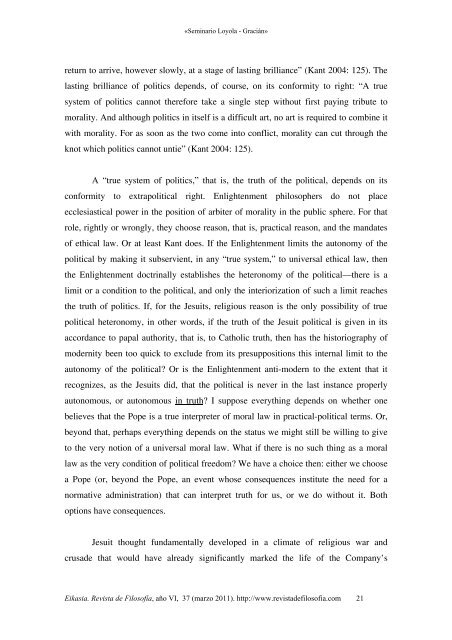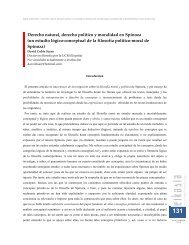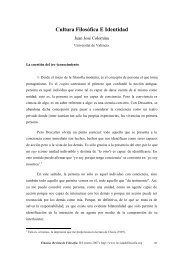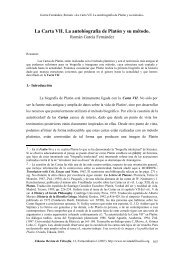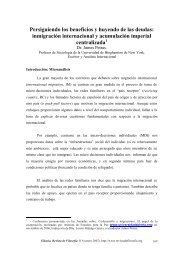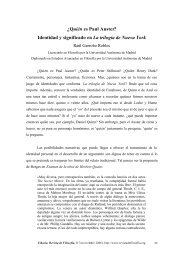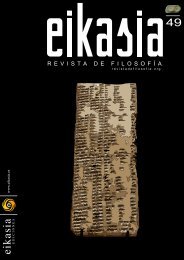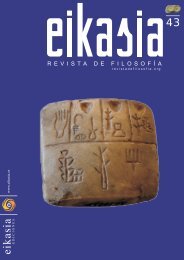Descargar número completo (3,83 MB) - Eikasia
Descargar número completo (3,83 MB) - Eikasia
Descargar número completo (3,83 MB) - Eikasia
You also want an ePaper? Increase the reach of your titles
YUMPU automatically turns print PDFs into web optimized ePapers that Google loves.
«Seminario Loyola - Gracián»<br />
return to arrive, however slowly, at a stage of lasting brilliance” (Kant 2004: 125). The<br />
lasting brilliance of politics depends, of course, on its conformity to right: “A true<br />
system of politics cannot therefore take a single step without first paying tribute to<br />
morality. And although politics in itself is a difficult art, no art is required to combine it<br />
with morality. For as soon as the two come into conflict, morality can cut through the<br />
knot which politics cannot untie” (Kant 2004: 125).<br />
A “true system of politics,” that is, the truth of the political, depends on its<br />
conformity to extrapolitical right. Enlightenment philosophers do not place<br />
ecclesiastical power in the position of arbiter of morality in the public sphere. For that<br />
role, rightly or wrongly, they choose reason, that is, practical reason, and the mandates<br />
of ethical law. Or at least Kant does. If the Enlightenment limits the autonomy of the<br />
political by making it subservient, in any “true system,” to universal ethical law, then<br />
the Enlightenment doctrinally establishes the heteronomy of the political—there is a<br />
limit or a condition to the political, and only the interiorization of such a limit reaches<br />
the truth of politics. If, for the Jesuits, religious reason is the only possibility of true<br />
political heteronomy, in other words, if the truth of the Jesuit political is given in its<br />
accordance to papal authority, that is, to Catholic truth, then has the historiography of<br />
modernity been too quick to exclude from its presuppositions this internal limit to the<br />
autonomy of the political? Or is the Enlightenment anti-modern to the extent that it<br />
recognizes, as the Jesuits did, that the political is never in the last instance properly<br />
autonomous, or autonomous in truth? I suppose everything depends on whether one<br />
believes that the Pope is a true interpreter of moral law in practical-political terms. Or,<br />
beyond that, perhaps everything depends on the status we might still be willing to give<br />
to the very notion of a universal moral law. What if there is no such thing as a moral<br />
law as the very condition of political freedom? We have a choice then: either we choose<br />
a Pope (or, beyond the Pope, an event whose consequences institute the need for a<br />
normative administration) that can interpret truth for us, or we do without it. Both<br />
options have consequences.<br />
Jesuit thought fundamentally developed in a climate of religious war and<br />
crusade that would have already significantly marked the life of the Company’s<br />
<strong>Eikasia</strong>. Revista de Filosofía, año VI, 37 (marzo 2011). http://www.revistadefilosofia.com 21


